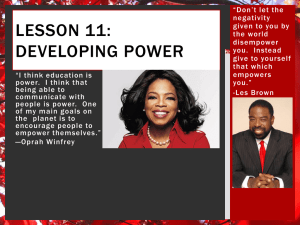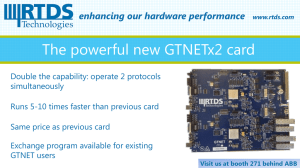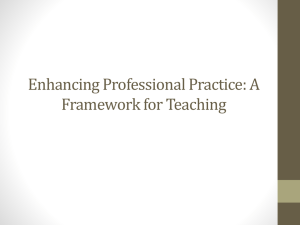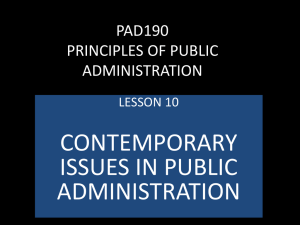ENHANCING YOUR PERSONAL POWER BASE
advertisement
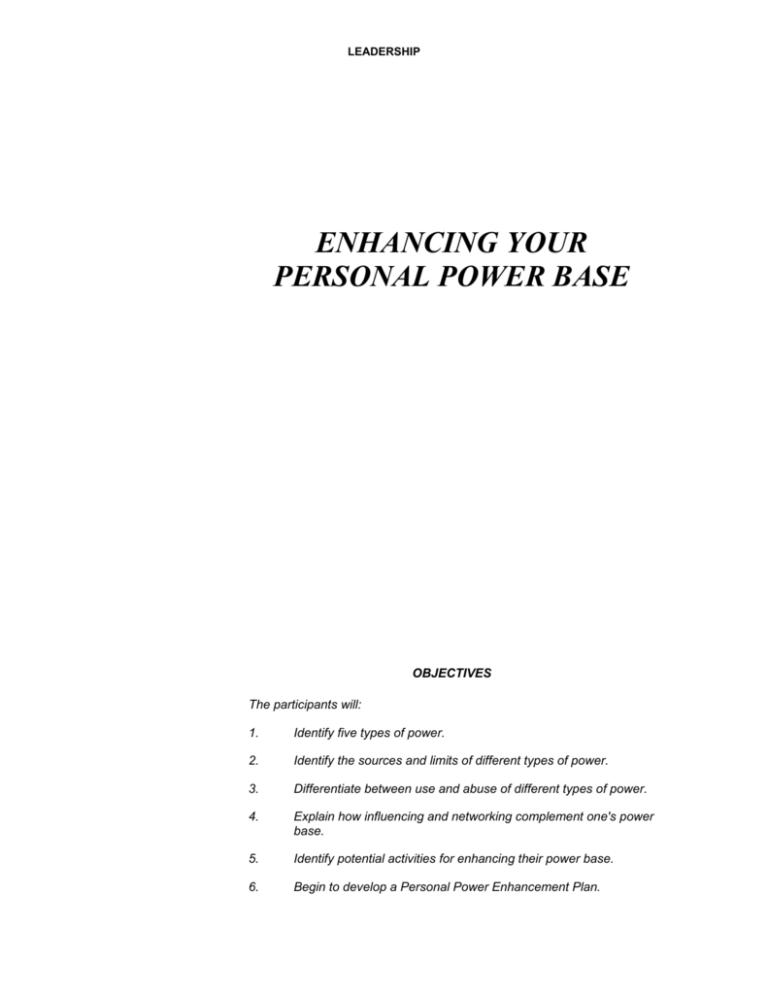
LEADERSHIP ENHANCING YOUR PERSONAL POWER BASE OBJECTIVES The participants will: 1. Identify five types of power. 2. Identify the sources and limits of different types of power. 3. Differentiate between use and abuse of different types of power. 4. Explain how influencing and networking complement one's power base. 5. Identify potential activities for enhancing their power base. 6. Begin to develop a Personal Power Enhancement Plan. ENHANCING YOUR PERSONAL POWER BASE POINTS FOR THE INSTRUCTOR This module is designed to make company officers (COs) aware of power as a critical leadership concept. For most people, the very mention of power carries a negative connotation. The purpose of the module is to convince participants that power is a necessary part of a leader's repertoire. The goal of the module is to give each participant the knowledge and skill needed to use power effectively. Participants learn the five types of power, the two basic sources of power, and the inherent limits of all power types. Armed with this information, participants analyze a series of ten video vignettes to gain proficiency in discriminating between appropriate use versus abuse of each type of power. Participants then examine special power skills which complement and enhance an individual's power base. The skills section focuses on two areas: influencing and networking. Participants explore specific behaviors which can increase each type of power. Finally, participants analyze their individual present power bases and map out personal power-building strategies to enhance their leadership effectiveness. METHODOLOGY This module includes lectures, brainstorming, analysis of video vignettes, and an individual activity. An optional small group activity is included for instructors who can devote an additional 2 hours. ESTIMATED TIME (Total Time: 3 hr.) 5 min. 10 min. 10 min. 30 min. 10 min. 50 min. 25 min. 20 min. 15 min. IG PP-2 Lecture Objectives and Overview Lecture Definition and Importance of Power Discussion Who Has Power? Interactive Lecture Types of Power Interactive Lecture Sources and Limits of Power Video and Activity 1 Analyzing Appropriate Use and Abuse of Power Lecture Power Skills Discussion Increasing Your Power Base Activity 2 Personal Power Enhancement Plan IG PP-5 IG PP-7 IG PP-9 IG PP-11 IG PP-17 IG PP-27 IG PP-35 IG PP-43 IG PP-47 ENHANCING YOUR PERSONAL POWER BASE 5 min. Lecture Summary IG PP-49 IG PP-3 ENHANCING YOUR PERSONAL POWER BASE AUDIOVISUAL OHTs PP.1 to PP.46 Video: "Analyzing Power Usage" Overhead projector Video player INSTRUCTOR PREPARATION IG PP-4 1. Review the lesson plan and activities. 2. Assemble necessary supplies. 3. Preview videotape and rewind. 3. Set up and test overhead projector. ENHANCING YOUR PERSONAL POWER BASE IG PP-5 ENHANCING YOUR PERSONAL POWER BASE ENHANCING YOUR PERSONAL POWER BASE 5 min. Lecture OHT PP.1 I. OBJECTIVES The participants will: A. Identify five types of power. B. Identify the sources and limits of different types of power. C. Differentiate between use and abuse of different types of power. D. Explain how influencing and networking complement one's power base. E. Identify potential activities for enhancing their power base. F. Begin to develop a Personal Power Enhancement Plan. OHT PP.2 II. OVERVIEW A. Definition and Importance of Power B. Who Has Power? C. Types of Power D. Sources and Limits of Power E. Analyzing Appropriate Use and Abuse of Power F. Power Skills G. Increasing Your Power Base H. Personal Power Enhancement Plan Pause here to acquaint participants with the Student Manual format. The manual begins with a detailed outline section IG PP-6 ENHANCING YOUR PERSONAL POWER BASE which includes all module activities. It is intended that participants use this section while the module is in session. IG PP-7 ENHANCING YOUR PERSONAL POWER BASE Assure participants that it is not necessary to take notes on lecture content unless they so desire. The note-taking section simply serves as a general outline of the lecture material with space provided to jot down interesting discussion points, etc. Immediately following this section is a detailed text which covers all module content. This text is intended to be read after the module presentation, so that participant attention can focus on actual classroom activity. 10 min. Lecture III. DEFINITION AND IMPORTANCE OF POWER Ask: How would you define power? How do you feel about power? After several participants respond, share the following: OHT PP.3 A. Definition: Power is being able to influence the attitudes and/or behaviors of others. 1. Not good or bad, not moral or immoral. 2. A neutral skill which can be used effectively or abused. 3. In other words, it's your ability to get others to do what you want! OHT PP.4 B. Relationship to leadership. 1. Appropriate use of power is an essential leadership skill. 2. Leadership is influencing others toward the accomplishment of organizational goals. 3. Leadership requires using power to influence others. (Power equals influence potential!) 4. A leader's effectiveness is dependent on the cooperation of others: OHT PP.5 a. IG PP-8 Subordinates. ENHANCING YOUR PERSONAL POWER BASE b. Peers. IG PP-9 ENHANCING YOUR PERSONAL POWER BASE c. 5. C. Superiors. Successful leaders minimize this dependency by establishing power over other people. Obligations of power. 1. The use of power over other persons implies their submission. 2. The "power-person" has an obligation to recognize this submission and protect those being influenced. 3. Ethical uses of power exclude: OHT PP.6 a. Exploiting others. b. Influencing others to illegal or immoral conduct. c. Reducing others' self-esteem. Point out that most instances of sexual harassment involve unethical use of power. OHT PP.7 4. Positive power usage assumes: a. Sensitivity to others. b. Preference for win-win solutions. c. Effective interpersonal skills. 10 min. Discussion IV. WHO HAS POWER? Ask: Name some individuals that you perceive as powerful…either persons you know or public figures. In what ways does this person demonstrate his/her power over others? Flipchart Record responses (key words only) on flipchart. IG PP-10 ENHANCING YOUR PERSONAL POWER BASE IG PP-11 ENHANCING YOUR PERSONAL POWER BASE As participants generate ideas, instructor should assure that the list includes examples of each specific type of power discussed in the following section. Instructor should be prepared to add examples of power types not included in the class list. Leave the list visible on wall during the following discussion on Types of Power. As you cover each type, ask participants to point out an example of that type of power from the posted list. 30 min. Interactive Lecture V. TYPES OF POWER OHT PP.8 Show OHT PP.8 again. Explain that any leader has a variety of powers which he/she can employ to influence others. OHT PP.9 A. Formal power. 1. Formal power is tied to your official position within the organization (chief, captain, company officer, etc.). 2. The position you occupy guarantees you a certain level of authority over your subordinates. 3. Within your assigned level of authority, you can direct or order your subordinates. 4. The higher your position is within the organization, the more formal power you possess. 5. When formal power is used, others comply because they believe you have the right to tell them what to do and they have an obligation to do it. OHT PP.10 Ask for an example of formal power from the posted list of power examples. IG PP-12 ENHANCING YOUR PERSONAL POWER BASE IG PP-13 ENHANCING YOUR PERSONAL POWER BASE IG PP-14 ENHANCING YOUR PERSONAL POWER BASE Possible examples include: - Lee Iacocca (or any corporate head). - The President (or any elected official). - A CO (or any supervisor, paid or volunteer). OHT PP.11 B. Reward power. 1. Reward power is the ability to give rewards in exchange for compliance. 2. Rewards can be official (raises, awards, promotions, citations, etc.) or informal ("atta-boy/girl," special recognition, favors, etc.). 3. Rewards must be meaningful to and desired by the person you are trying to influence. 4. When reward power is used, others comply because they want to obtain some benefit which you control! OHT PP.12 Ask for an example of reward power from the posted list of power examples. Possible examples include: - A sports team coach (can reward by allowing to play). - Union leaders (can reward by gaining benefits for members). OHT PP.13 C. Coercive power. 1. Coercive power is the ability to punish for noncompliance. 2. The opposite side of the coin from reward power. 3. Punishments can also be official (reprimand, suspension, loss of pay, IG PP-15 ENHANCING YOUR PERSONAL POWER BASE termination, etc.) or informal (isolation, ignoring, peer pressure, etc.). IG PP-16 ENHANCING YOUR PERSONAL POWER BASE 4. Punishments must also be meaningful to the person you are trying to influence. 5. When coercive power is used, others comply because they want to avoid some punishment which you control. OHT PP.14 Ask for an example of coercive power from the posted list of power examples. Possible examples include: - A judge (determines fines, sentences, etc.). - A parent (can administer punishment and/or withhold rewards). OHT PP.15 D. Expert power. 1. Expert power is having more knowledge and/or ability than others in some specific area and using this to your advantage. 2. It is not enough to be an expert; others must be aware of your expertise. 3. When expert power is used, others comply because they believe you know more than they do and they respect your expertise. OHT PP.16 Point out that "information power" is a subset of expert power. Just being the person who always knows the latest information and news provides a certain amount of power. Ask for an example of expert power from the posted list of power examples. Possible examples include: - A doctor (to non-doctors). - A lawyer (to non-lawyers). IG PP-17 ENHANCING YOUR PERSONAL POWER BASE - A firefighter (to non-firefighters). IG PP-18 ENHANCING YOUR PERSONAL POWER BASE IG PP-19 ENHANCING YOUR PERSONAL POWER BASE OHT PP.17 E. Referent power. 1. Referent power is being liked, admired, and trusted by others. 2. Using charisma to your advantage. 3. When referent power is used, others comply because they want to please you and they want your personal approval. OHT PP.18 Ask for an example of referent power from the posted list of power examples. Possible examples include: - John F. Kennedy. - Jim Jones. - Elvis Presley. 10 min. Interactive Lecture VI. SOURCES AND LIMITS OF POWER A. All five types of power come from two basic sources. OHT PP.19 1. IG PP-20 Ascribed or position power is given to an individual by virtue of his/her position within the organization. a. Generally, your official rank determines the amount of formal, reward, and coercive power you possess. b. Subordinate compliance to position power is based on their required acceptance of your organizational authority. c. Subordinates comply because they must. ENHANCING YOUR PERSONAL POWER BASE IG PP-21 ENHANCING YOUR PERSONAL POWER BASE IG PP-22 ENHANCING YOUR PERSONAL POWER BASE Ask participants for examples of formal, reward, and coercive power available to COs. If the group includes members of volunteer departments, make sure some examples apply to volunteers. Encourage all participants to jot down ideas which apply to them personally for later use in developing their own Power Enhancement Plan. OHT PP.20 2. Achieved or personal power is earned by an individual. a. Expert and referent powers fall under this category. b. Your formal position within the organization--no matter how high-carries no guarantee of these powers. c. In fact, quite often those individuals with no position power manage to build an extremely effective power base of personal power alone. d. Individuals earn personal power through accumulation of knowledge and skill and through effective interpersonal relations. e. Subordinate compliance is based on respect and/or admiration for you. f. Subordinates comply because they want to! Ask for personal examples of expert and referent power at the CO level. If the group includes members of volunteer departments, make sure some examples apply to volunteers. IG PP-23 ENHANCING YOUR PERSONAL POWER BASE IG PP-24 ENHANCING YOUR PERSONAL POWER BASE OHT PP.21 B. All five types of power can be used effectively and work to your advantage. But there are limits! 1. Formal, reward, and coercive power generally only work on subordinates-downward power only! 2. Formal power is limited by your assigned scope of authority. 3. Reward power is limited by the desirability of the promised reward. 4. Overuse of coercive power leads to covert resistance. 5. Expert power is limited by others' perception of the importance/ usefulness of the area of expertise. OHT PP.22 C. Other facts about use of power. 1. Expert and referent powers can work downward (subordinate), across (peers), and upward (superiors). 2. Individuals with low self-confidence rely more on formal and coercive powers. 3. The most effective leaders rely more on referent and expert powers. 4. Compliance in visible, routine tasks can be influenced by formal power alone. Less visible, more creative tasks require referent or expert powers. 5. The more sophisticated/self-confident/ capable individuals are apt to be more influenced by expert and referent powers. 6. Use of power expends some of a limited source of energy--the more you use, the more you lose! IG PP-25 ENHANCING YOUR PERSONAL POWER BASE IG PP-26 ENHANCING YOUR PERSONAL POWER BASE IG PP-27 ENHANCING YOUR PERSONAL POWER BASE D. Anticipating outcomes. Using any of the five power types can produce various responses from those you are trying to influence. These responses range from commitment (enthusiastic cooperation) to compliance (neutral acceptance) to resistance (unwillingness to comply). An effective leader uses power sparingly and does not waste power plays on situations which are likely to provoke resistance. This chart is a handy guide to predict subordinate responses to the use of power in different situations. SM p. PP-6 Refer participants to chart in SM. OHTs PP.23 to PP.28 Show OHTs and discuss. Make sure participants understand the difference between commitment and compliance. IG PP-28 ENHANCING YOUR PERSONAL POWER BASE IG PP-29 ENHANCING YOUR PERSONAL POWER BASE USING DIFFERENT POWER TYPES AND LIKELY OUTCOMES WHEN YOU USE TYPES OF OUTCOME Commitment is Compliance is Resistance is Referent Power LIKELY If request is believed to be important to leader. POSSIBLE If request is perceived as unimportant to leader. POSSIBLE If request is perceived as harmful to leader. Expert Power LIKELY If request is persuasive and subordinates share leader's goals. POSSIBLE If request is persuasive but subordinates don't care about goals. POSSIBLE If leader is arrogant or insulting, or if subordinates oppose goals. Formal Power POSSIBLE If request is polite and appropriate. LIKELY If request is seen as appropriate. POSSIBLE If request is arrogant and/or inappropriate. Reward Power POSSIBLE If used in a subtle, very personal way. LIKELY If used in a routine, impersonal way. POSSIBLE If used in a manipulative, arrogant way. Coercive Power VERY UNLIKELY Regardless of how it's done! POSSIBLE If used in a helpful, nonpunitive way. LIKELY If overused or used in a hostile or manipulative way. Chart is adapted from Gary A. Yukl's Leadership in Organizations. New Jersey: Prentice-Hall, Inc.; 1981; p. 45 IG PP-30 ENHANCING YOUR PERSONAL POWER BASE IG PP-31 ENHANCING YOUR PERSONAL POWER BASE 50 min. Video and Activity 1 ACTIVITY 1 ANALYZING APPROPRIATE USE AND ABUSE OF POWER SM p. PP-7 and PP-8 Refer participants to activity worksheet in SM. Also refer them to boxed lists of "Do's" and "Don'ts." SM p. PP-9 and PP-10 Show one scenario and stop videotape. participants to complete the worksheet. Allow time for Ask participants to identify the type of power portrayed in the scenario. Then ask participants to determine whether the scenario illustrated appropriate use or abuse of that type of power. If the scenario illustrated appropriate use, ask participants to point out specific examples of effectiveness from the vignette, using the relevant "Do's" as a guideline. If the scenario illustrated abuse, ask participants to point out specific examples of abusive behavior from the vignette, using the relevant "Don'ts" as a guideline. Follow same procedure for all 7 vignettes. Listed below are the correct analyses for each scenario (in order of appearance): IG PP-32 1. Formal Power--appropriate use 2. Coercive Power--abuse 3. Expert Power--appropriate use 4. Reward Power--abuse 5. Coercive Power--appropriate use 6. Expert Power--abuse 7. Referent Power--appropriate use ENHANCING YOUR PERSONAL POWER BASE IG PP-33 ENHANCING YOUR PERSONAL POWER BASE Summarize by reviewing the lists of do's and don'ts for each power type. OHT PP.29 A. Formal power. 1. Do: a. Be polite. b. Make requests in a confident tone. c. Be specific. d. Check for comprehension. e. Make sure your request is within your scope of authority. f. Require compliance. g. Be responsive to subordinate concerns. OHT PP.30 2. IG PP-34 Don't: a. Make demands outside of your scope of authority. b. Be arrogant and/or discourteous. c. Give ambiguous orders. d. Make needless demands just to prove you are in charge! e. Bully subordinates. ENHANCING YOUR PERSONAL POWER BASE IG PP-35 ENHANCING YOUR PERSONAL POWER BASE OHT PP.31 B. Reward power. 1. Do: a. Make sure your request is achievable. b. Make sure the reward is meaningful (desired). c. Make sure you have the ability/authority to deliver the reward. d. Make sure your request is proper and ethical. OHT PP.32 2. Don't: a. Offer rewards for an undoable task. b. Offer meaningless rewards. c. Offer rewards you can't deliver. d. Offer rewards for improper behavior (bribes). OHT PP.33 C. Coercive power. 1. IG PP-36 Do: a. Inform subordinates about rules and penalties for violation. b. Administer discipline fairly and consistently. c. Stay calm and avoid hostility. d. Administer punishment privately. e. Make sure you have the ability/authority to deliver the threatened punishment. ENHANCING YOUR PERSONAL POWER BASE IG PP-37 ENHANCING YOUR PERSONAL POWER BASE OHT PP.34 2. Don't: a. Make up rules as you go along. b. Play favorites. c. Punish without being sure of your facts. d. Threaten to do something you know is beyond your authority. e. Punish in public. OHT PP.35 D. Expert power. 1. Do: a. Promote/advertise your own expertise in a subtle way. b. Prove/demonstrate your expertise. c. Use your expertise to help others. d. Use your expertise to solve organizational problems. e. Stay humble. OHT PP.36 2. IG PP-38 Don't: a. Flaunt your expertise. b. Claim expertise you don't possess. c. Use your expertise to reduce others' self-esteem. d. Hoard information which others need. e. Get conceited and arrogant. ENHANCING YOUR PERSONAL POWER BASE IG PP-39 ENHANCING YOUR PERSONAL POWER BASE OHT PP.37 E. Referent power. 1. Do: a. Accept others as they are. b. Express affection and trust. c. Show concern for others' welfare. d. Be a good role model. e. Learn how to make personal appeals. (Do it for ME!) OHT PP.38 2. Don't: a. Overuse personal appeals. b. Violate others' trust in you. c. Take advantage of others because they like you. d. Ask others to do something improper out of friendship. 25 min. Lecture OHT PP.39 VII. POWER SKILLS A. IG PP-40 Influencing. 1. A leader's effectiveness is based on how well he/she can influence others. 2. Influence attempts are critical and constant leadership activities. 3. Successful leaders carefully map out an influence plan whenever an intended influence attempt is important. 4. An influence plan helps a leader determine which power strategies would be most appropriate. ENHANCING YOUR PERSONAL POWER BASE IG PP-41 ENHANCING YOUR PERSONAL POWER BASE OHT PP.40 5. To formulate an influence plan, answer the following questions: a. Whom do you want to influence? b. What exactly do you want them to do? c. What's in it for them if they agree? (Can you use any reward power?) d. Do they lose anything if they refuse? (Can you subtly use any coercive power?) e. How do they feel about you? (Do you have any referent or expert power?) f. What will be the main objections offered by the person(s) you wish to influence? (Be specific.) g. How will you respond to each objection? (Be specific.) h. What exactly do you plan to say when you make your initial suggestion? (Write it down and rehearse.) OHT PP.41 SM p. PP-11 Refer participants to the sample influence plan in Student Manual. Allow time for review and questions. OHT PP.42 6. IG PP-42 Characteristics of influential people. (From Building Your Power Base by Thomas L. Quinn, p. 55.) a. Know what they want. b. Know they have a right to get what they want. c. Are articulate. ENHANCING YOUR PERSONAL POWER BASE IG PP-43 ENHANCING YOUR PERSONAL POWER BASE d. Are sensitive. e. Have credibility. f. Know how to deal with opposition. g. Have good selling skills. h. Know what motivates others. i. Seek visibility. Ask participants to refer back to list of power people developed at the beginning of the module. Discuss whether the examples listed exhibit these characteristics. SM p. PP-23 Optional Small Group Activity on Developing an Influence Plan is outlined at the end of the module. B. Networking. OHT PP.43 1. Networking is developing cooperative relationships with people who can or might someday be able to assist you in reaching a goal. Stress the cooperative nature of networking--a 2-way street. 2. A network is an informal, unstructured support system. 3. Your network might include: OHT PP.44 IG PP-44 a. People who have expertise in areas you do not. b. People with lots of power (both personal and position). c. People who have access to vital information. ENHANCING YOUR PERSONAL POWER BASE IG PP-45 ENHANCING YOUR PERSONAL POWER BASE d. People who have access to decision-makers. e. People who control resources. 4. Your network should include subordinates, peers, and bosses within your own organizations. 5. Your network should also include individuals outside your organization. 6. The broader and larger your network, the more benefit you receive. 7. Once you have targeted specific individuals you would like to network with, you need to work at cultivating your relationship: OHT PP.45 a. Identify and capitalize on areas of common interest. b. Identify ways you can help them. (Build up a bank of owed favors!) c. Identify resources you can trade. d. Do things and say things that make them like you, respect you, want to help you. Ask participants for examples of techniques they use to build and/or maintain an active network. Possible responses include: - Maintaining a card-file on people with whom you'd like to network. For each person, include important information (name, address, phone number, why he/she might be helpful to you, etc.). - Keeping in touch regularly, not just when you need help (notes, cards on special occasions, phone calls, lunch, etc.). - Sending congratulations when someone gets promoted, elected, honored, etc. IG PP-46 ENHANCING YOUR PERSONAL POWER BASE - Having your own business cards. IG PP-47 ENHANCING YOUR PERSONAL POWER BASE 20 min. Discussion VIII. INCREASING YOUR POWER BASE Point out that participants should now have a fairly clear picture of the various types of power available to them as COs. Flipchart Ask participants to identify specific actions which could be used to increase their power base. Go through each of the five power types and list responses on flipcharts. Leave flipcharts visible for all participants to refer to during next activity. Possible responses are listed below. A. B. IG PP-48 Increasing your formal power. 1. Move up in the organization. 2. Persuade management to give more responsibility and authority to your position. 3. Initiate projects (volunteer to head up a task force to solve a persistent problem, etc.). Increasing your reward power. 1. Move up in the organization. 2. Persuade management to give more reward power to your position. 3. Identify and offer meaningful rewards which do not depend on your organizational position (informal rewards). 4. Capitalize on your referent power to make all rewards more desirable. ENHANCING YOUR PERSONAL POWER BASE IG PP-49 ENHANCING YOUR PERSONAL POWER BASE 5. C. D. E. Increasing your coercive power. 1. Move up in the organization. 2. Persuade management to give more coercive power to your position. 3. Use the coercive power you have sparingly--make it count! 4. Build a reputation as one who is fair and consistent--don't play favorites. 5. Don't shirk your responsibility to administer discipline when it is required. 6. Learn as much as you can about motivation and values of subordinates. Increasing your expert power base. 1. Develop a specialization in an area where others need help. 2. Create a need for your specialized knowledge. 3. Volunteer for assignments which will help you learn skills and/or gain information most of your peers do not have. 4. Be an avid learner--read, take classes, listen, etc. 5. Make yourself visible--publicize your knowledge and achievement. 6. Make yourself available when your special expertise can solve a nagging problem. Increasing your referent power base. 1. IG PP-50 Learn as much as you can about motivation and values of subordinates. Build a strong network. ENHANCING YOUR PERSONAL POWER BASE IG PP-51 ENHANCING YOUR PERSONAL POWER BASE 2. Negotiate effectively. 3. Be a good listener. 4. Build your personal charisma--do things that make others like you, admire you, and trust you. 5. Share your legitimate power with subordinates. 6. Share your expert power with those who need help. 7. Try to divide and conquer your adversaries. Remember: Loyalty and devotion are given to those who are sensitive to the needs and feelings of others, who treat others fairly, and who actively defend others' interests. 15 min. Individual Activity 2 ACTIVITY 2 PERSONAL POWER ENHANCEMENT PLAN Briefly summarize the module content. Point out that the real test of a worthwhile learning experience is putting the new information to work for you. SM p. PP-17 Direct participants to the Personal Power Enhancement Plan in their Student Manual. Explain the steps. Advise participants that the final 15 minutes (or whatever time remains) will be devoted to working on their own plan. Acknowledge that they probably will not complete the plan during this time, but they will be able to make rough notes for later finalization. Emphasize the great potential gains available to each person if they are willing to persistently work at building an effective power arsenal. Wish them well in their powerbuilding efforts. IG PP-52 ENHANCING YOUR PERSONAL POWER BASE As participants start working on their plans, circulate around room to answer questions, offer assistance, etc. IG PP-53 ENHANCING YOUR PERSONAL POWER BASE 5 min. Lecture IX. SUMMARY OHT PP.46 IG PP-54 A. Appropriate use of power is a critical leadership skill. B. COs have a variety of powers available to them. C. Formal, reward, and coercive powers generally work downward only. D. Expert and referent powers work downward, upward, and across. E. Effective COs consciously strive to enhance their own power base. ENHANCING YOUR PERSONAL POWER BASE IG PP-55 ENHANCING YOUR PERSONAL POWER BASE Small Group Activity (Optional) OPTIONAL ACTIVITY DEVELOPING AN INFLUENCE PLAN Activity Times: Introduction 5 min. Small groups 60 min. Role plays 5 min. each Role play critiques 10 min. each Setup Instructions: 1. Divide class into small groups. (Determine appropriate number of groups for total class size; 4 small groups are ideal. Small groups must have a minimum of 4 persons and a maximum of 10 persons.) 2. Read through Small Group Activity instructions and answer any questions. 3. Assign each group to a breakout room. 4. Announce deadline time for return to main group. 5. Circulate among groups during activity to make sure they are on track. SM. p. PP-23 Process Instructions: 1. Limit role plays to about 5 minutes. 2. After each role play is completed: 3. IG PP-56 a. Ask for comments from the role players. b. Ask for comments from the observers. Limit discussion/critique to about 10 minutes for each role play. ENHANCING YOUR PERSONAL POWER BASE 4. Conclude activity by emphasizing the value of developing an influence plan for important on-the-job influence attempts. IG PP-57
